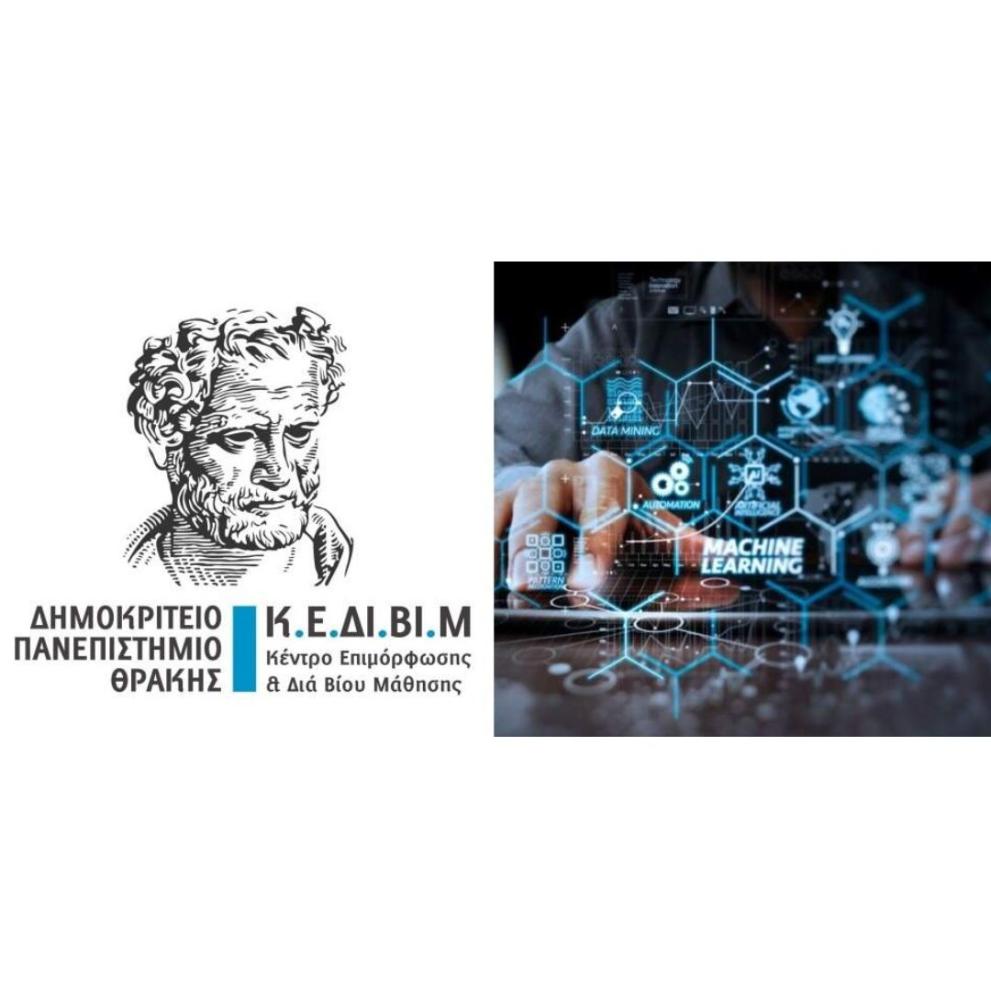Fourth edition of Artificial Intelligence and Mechanical Learning Program

The KE.DI.VI.M. of DUTH organises for the fourth time the distance learning training programme “Artificial Intelligence and Mechanical Learning: Theory and Applications’ from the 4 March 2024 to the 4 July 2024.
Electronic submission of applications has already started on 24 January and ends on 24 February. The program is aimed at all those who want to be trained in Artificial Intelligence and Mechanical Learning issues with practical applications: high school graduates; undergraduate, postgraduate and doctoral students; & Graduates of Greek and Foreign Universities, After successful monitoring and evaluation, the program leads to the acquisition of a Certificate ofSpecialised Training204 hours and 7 ECTS.
Purpose of the programme
Scientific classification and prognosis is traditionally done by methods of Mathematics, Statistics and Econometrics. In the last 30 years at the same time, new approaches have emerged, mainly from the Polytechnic Schools: Artificial Intelligence (AI) and Mechanical Learning (MM), two interrelated concepts that encompass computational systems, methodologies and techniques. Their applications to real problems have produced results comparable and often better than traditional methodological approaches. The Programme will fill the gap in the practical and empirical use of AI and MM in real forecasting and classification problems.
The program does not presuppose any prior knowledge of TNMM or Python learners, and introduces – trains trainers in the philosophy, methodologies and techniques of Artificial Intelligence and Machine Learning with an emphasis on practical applications. The aim of the programme is to understand the application of AI and MM algorithms, without (necessarily) deepening into the mathematical, algorithmic or programmatic part of these methods. Thus, these can be known and become tools of practical and directly applicable economic and business analysis-foreseeing by any interested party without prior relevant specialised knowledge.
All major machine learning and artificial intelligence (AI) algorithms are presented. For example, K-Means, Hierarchical Clustering for grouping, reduction of dimensions, detection of anomalies, etc., as well as supervised learning, Neural Networks, Support Vector Machines and Regression, Decision Trees, Random Forests, logit, K-NN, etc. as well as related Boosting and Bagging techniques. These techniques are compared with classical relevant methods for comparison and understanding of similarities and differences.
Training is carried out in the basic use of the Python language without any prior knowledge being required. Upon successful completion of the program, learners will have the relevant toolbox with ready-made Python code that can be used immediately and easily in any prediction or classification problem for any future application in their studies or work.
Programme implementation methodology
The programme is implemented through asynchronous distance learning without the need for physical presence. Asynchronous asynchronous teaching is considered an appropriate methodology as it enables participants from different geographical areas to adapt their study according to their individual needs and free time. The thematic modules will contain physical instruction through recorded video in the form of webinar. Teachers will present, analyse and explain selected concepts or subjects.
In addition, rich material will be provided in the form of texts in pdf, ppt presentations, Python code, literature and self-assessment exercises. When necessary, there will also be remote meetings on the Google Meet platform on predetermined dates with optional presence for immediate discussion and answers to learners’ questions. In these cases, after their completion, the videos will also be posted on the platform.
Assessment of learners
At the end of the program, the trainees will be evaluated by submitting a short project, where they will use the code provided to them to make predictions on specific topics of general and special interest, such as forecasting stock prices, indices, cryptocurrencies, exchange rates, interest rates, insurance benefits, clientele, purchases and visits to shops, fraud, etc. Upon successful completion, the trainees will receive a Certificate of Specialised Training in Artificial Intelligence and Machine Learning, from the University of Thessaloniki. In case of unsuccessful completion, the trainees will receive a Certificate of Follow-up from the DUTH.
For more information, cost of participation and submission of applications, click here
©K.DI.VI.M./TH




